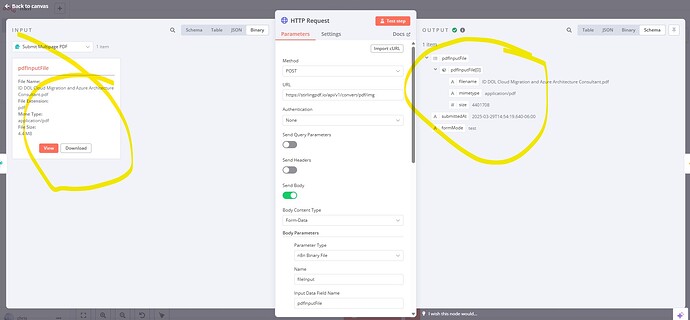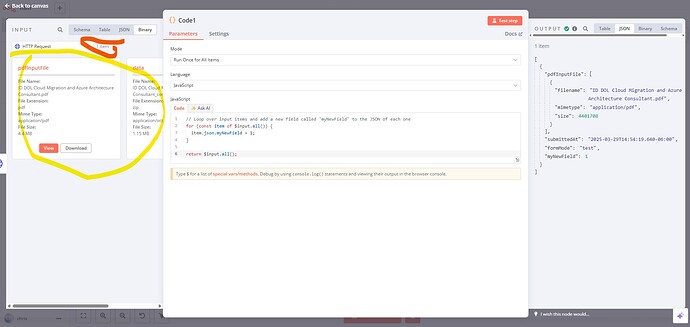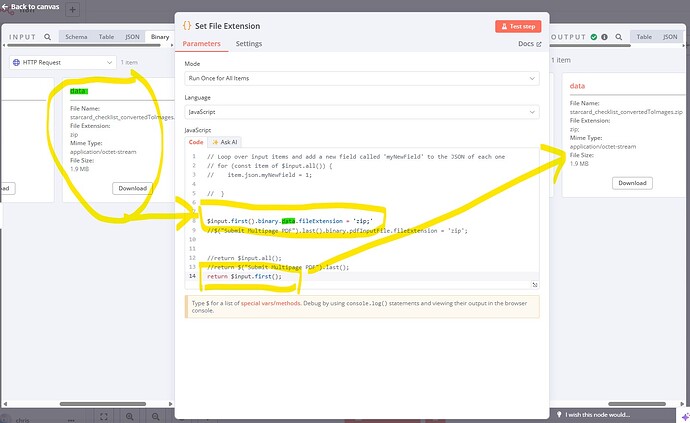Describe the problem/error/question
Using HTTPS Request node, I post a PDF to Stirling PDF and it responds with a ZIP file containing the JPG version of the PDF.
However, the HTTPS node does not output this binary file. In the screenshot, see the binary output “items”=1, but it shows both the input pdf file and the returned zip file, so that should be 2 items?. Oddly I can download these from this screen, the PDF file is the actual input file to the HTTP request, and the ZIP file is the actual file returned from the HTTPS request. However, the ZIP file does not appear in the HTTPS node output Schema, and although it appears listed in the binary files tab on the output, I can’t actually access it from subsequent nodes. Am I missing something obvious? I’d appreciate any pointers.
HTTPS Node, note the output shows binary items = 1, although there are 2 files present.
HTTPS Node, sam as above, but see Schema only shows the PDF file.
Here is a default Code see the input shows binary items =1 although 2 files are present.
Same as above showing schema is missing the ZIP file,.
What is the error message (if any)?
None
Please share your workflow
{
“nodes”: [
{
“parameters”: {
“formTitle”: “Load File”,
“formFields”: {
“values”: [
{
“fieldLabel”: “pdfInputFile”,
“fieldType”: “file”,
“acceptFileTypes”: “*.zip”,
“requiredField”: true
}
]
},
“options”: {}
},
“type”: “n8n-nodes-base.formTrigger”,
“typeVersion”: 2.2,
“position”: [
-920,
560
],
“id”: “dc85bdb2-9566-4284-a67c-c1056e8f251a”,
“name”: “Submit Multipage PDF”,
“webhookId”: “260fa9ba-0878-4eb2-9bc6-b2e36974b2db”
},
{
“parameters”: {
“method”: “POST”,
“url”: “https://stirlingpdf.io/api/v1/convert/pdf/img”,
“sendBody”: true,
“contentType”: “multipart-form-data”,
“bodyParameters”: {
“parameters”: [
{
“parameterType”: “formBinaryData”,
“name”: “fileInput”,
“inputDataFieldName”: “pdfInputFile”
},
{
“name”: “imageFormat”,
“value”: “jpg”
},
{
“name”: “singleOrMultiple”,
“value”: “multiple”
},
{
“name”: “dpi”,
“value”: “300”
}
]
},
“options”: {}
},
“type”: “n8n-nodes-base.httpRequest”,
“typeVersion”: 4.2,
“position”: [
-640,
560
],
“id”: “df861623-db6c-4348-825d-946bd3902c09”,
“name”: “HTTP Request”,
“alwaysOutputData”: true
},
{
“parameters”: {
“jsCode”: “// Loop over input items and add a new field called ‘myNewField’ to the JSON of each one\nfor (const item of $input.all()) {\n item.json.myNewField = 1;\n}\n\nreturn $input.all();”
},
“type”: “n8n-nodes-base.code”,
“typeVersion”: 2,
“position”: [
-340,
560
],
“id”: “81b5ba03-e803-44df-8b04-be1470e39d13”,
“name”: “Code1”
}
],
“connections”: {
“Submit Multipage PDF”: {
“main”: [
[
{
“node”: “HTTP Request”,
“type”: “main”,
“index”: 0
}
]
]
},
“HTTP Request”: {
“main”: [
[
{
“node”: “Code1”,
“type”: “main”,
“index”: 0
}
]
]
}
},
“pinData”: {},
“meta”: {
“templateCredsSetupCompleted”: true,
“instanceId”: “051c749b6a6060f3aa911b6c669df739f74b1f876a4b14a167ec1cfbe11ebba6”
}
}
Information on your n8n setup
n8n version:1.84.3
Database (default: SQLite): N/A Default
n8n EXECUTIONS_PROCESS setting (default: own, main): Default
Running n8n via (Docker, npm, n8n cloud, desktop app): Cloud
Operating system: Windows 11, tested with Chrome and Edge




